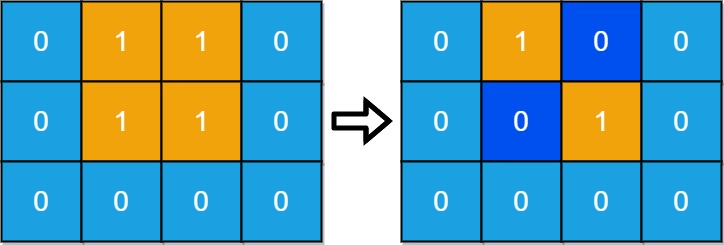LeetCode in Kotlin
1568. Minimum Number of Days to Disconnect Island
Hard
You are given an m x n binary grid grid where 1 represents land and 0 represents water. An island is a maximal 4-directionally (horizontal or vertical) connected group of 1’s.
The grid is said to be connected if we have exactly one island, otherwise is said disconnected.
In one day, we are allowed to change any single land cell (1) into a water cell (0).
Return the minimum number of days to disconnect the grid.
Example 1:

Input: grid = [[0,1,1,0],[0,1,1,0],[0,0,0,0]]
Output: 2
Explanation: We need at least 2 days to get a disconnected grid. Change land grid[1][1] and grid[0][2] to water and get 2 disconnected island.
Example 2:

Input: grid = [[1,1]]
Output: 2
Explanation: Grid of full water is also disconnected ([[1,1]] -> [[0,0]]), 0 islands.
Constraints:
m == grid.lengthn == grid[i].length1 <= m, n <= 30grid[i][j]is either0or1.
Solution
@Suppress("kotlin:S107")
class Solution {
private val dirs = arrayOf(intArrayOf(0, 1), intArrayOf(0, -1), intArrayOf(1, 0), intArrayOf(-1, 0))
fun minDays(grid: Array<IntArray>): Int {
val m = grid.size
val n = grid[0].size
var numOfIslands = 0
var hasArticulationPoint = false
var color = 1
var minIslandSize = m * n
val time = Array(m) { IntArray(n) }
val low = Array(m) { IntArray(n) }
for (i in 0 until m) {
for (j in 0 until n) {
if (grid[i][j] == 1) {
numOfIslands++
color++
val articulationPoints: MutableList<Int> = ArrayList()
val islandSize = IntArray(1)
tarjan(i, j, -1, -1, 0, time, low, grid, articulationPoints, color, islandSize)
minIslandSize = Math.min(minIslandSize, islandSize[0])
if (articulationPoints.isNotEmpty()) {
hasArticulationPoint = true
}
}
}
}
if (numOfIslands >= 2) {
return 0
}
if (numOfIslands == 0) {
return 0
}
if (numOfIslands == 1 && minIslandSize == 1) {
return 1
}
return if (hasArticulationPoint) 1 else 2
}
private fun tarjan(
x: Int,
y: Int,
prex: Int,
prey: Int,
time: Int,
times: Array<IntArray>,
lows: Array<IntArray>,
grid: Array<IntArray>,
articulationPoints: MutableList<Int>,
color: Int,
islandSize: IntArray,
) {
times[x][y] = time
lows[x][y] = time
grid[x][y] = color
islandSize[0]++
var children = 0
for (dir in dirs) {
val nx = x + dir[0]
val ny = y + dir[1]
if (nx < 0 || ny < 0 || nx >= grid.size || ny >= grid[0].size) {
continue
}
if (grid[nx][ny] == 1) {
children++
tarjan(
nx,
ny,
x,
y,
time + 1,
times,
lows,
grid,
articulationPoints,
color,
islandSize,
)
lows[x][y] = Math.min(lows[x][y], lows[nx][ny])
if (prex != -1 && lows[nx][ny] >= time) {
articulationPoints.add(x * grid.size + y)
}
} else if ((nx != prex || ny != prey) && grid[nx][ny] != 0) {
lows[x][y] = Math.min(lows[x][y], times[nx][ny])
}
}
if (prex == -1 && children > 1) {
articulationPoints.add(x * grid.size + y)
}
}
}

